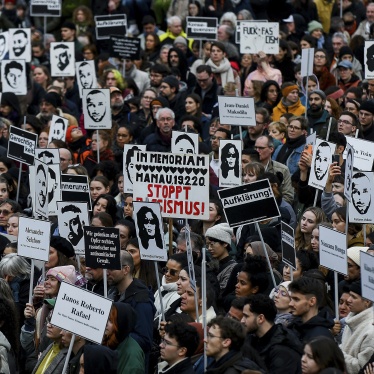Update: On November 6, Dilmurod Ergashev was deported from Germany on a flight out of Dusseldorf Airport, accompanied by officers of the German Federal Police, and handed over to Tajikistani authorities on November 7 at the Dushanbe airport. According to witness statements, Tajikistani authorities immediately handcuffed Ergashev, placing a black bag over his head before putting him into a vehicle and driving away. His whereabouts are currently unknown.
According to his lawyer, in rejecting Ergashev’s most recent asylum request submitted to oppose the deportation order, a German court questioned whether Ergashev’s opposition activities were genuine and said he was using them to increase the possibility to gain asylum.
An administrative court in Germany this week ordered the deportation of Dilmurod Ergashev, a Tajik opposition political activist, despite the risk of his detention and torture in Tajikistan.
On October 28, a court in the city of Kleve, near Germany’s border with the Netherlands, ordered Ergashev’s deportation in early November. If deported to Tajikistan, whose authoritarian government has had a longstanding crackdown on free speech and the political opposition, Ergashev risks facing detention, torture, and long-term imprisonment.
International law, including multiple treaties to which Germany is bound, prohibits “refoulement,” returning a person to a country where they are at risk of torture or cruel or inhumane treatment.
In 2023, Germany deported two Tajik dissidents, Abdullohi Shamsiddin and Bilol Qurbonaliev, to Tajikistan. Upon arrival they were immediately detained and later sentenced to seven and ten years in prison respectively, based on bogus charges of attempts to overthrow the constitutional order and organization of criminal groups. Shamsiddin has reportedly been mistreated in detention.
Ergashev, 40, is an active member of Group 24, an opposition movement banned in Tajikistan, and part of the Reforms and Development of Tajikistan movement formed by exiled Tajik dissidents. He has taken part in several demonstrations in Berlin in front of Tajikistan’s embassy, including the September 2023 protest during Tajik President Emomali Rahmon’s visit to Germany.
He has lived in Germany since February 2011 and first applied for asylum on political grounds that month. He has had several asylum requests rejected by German authorities since.
According to his lawyer, German immigration authorities have questioned whether Ergashev’s commitment to opposition causes is genuine.
Tajikistan’s authorities systematically persecute opposition members, especially those they see as affiliated with banned movements, such as Group 24, both inside and outside the country. A recent Human Rights Watch report on this type of transnational repression cited Tajikistan as a country of major concern. The government regularly targets critics living abroad on charges of extremism and terrorism-related activities, leading to long jail terms and mistreatment if they are forcibly returned.
Ergashev's documented participation in protests in Germany and his activism online make him a clear target.
German authorities should immediately suspend Ergashev's deportation and conduct a thorough review of his protection needs. He should not be deported to a country where he faces a serious risk of torture.










